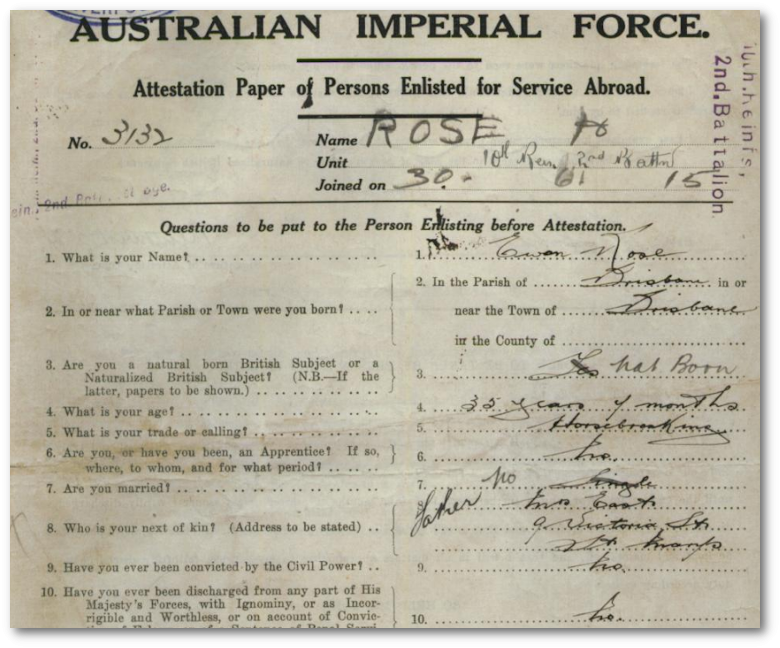
Service record, Ewan Rose, 14th Light Trench Mortar Battery, courtesy of the National Library of Australia, Series B2455 Item ID 8036851
Indigenous Australian, Ewan 'Hughie' Rose, 14th Light Trench Mortar Battery
Ewan ‘Hughie’ Rose was born in Brisbane to William Rose in 1876. Rose who was known as a champion ‘rough rider’, football player and horsebreaker, had been residing with the East family in St Mary’s, NSW, for many years. Rose volunteered to serve with the first AIF in June 1915 with several other St Mary’s lads, while allied troops were still serving on the Gallipoli Peninsula. He embarked with the 10th Reinforcements for the 2nd Infantry Battalion in October 1915 arriving in Egypt 4 weeks later.
Rose was admitted to hospital on 27 November 1915 with mumps, but soon joined his allotted Battalion at Tel el Kebir in January 1916. Here men were being trained and units brought to strength as Battalions were reformed to either stay in the Middle East or embark for France and the trenches of the Western Front.
Ewan Rose was of strong build, 5’ 7’’ and a former rugby player, with good horseman skills - it is a wonder he wasn’t selected for the Light Horse, instead he was selected to join the 54th Infantry Battalion, and embarked for Marseilles and northern France in June 1916, where they were billeted in various farm houses just south of Bailleul.
Just a few weeks later in July 1916 it was decided to form the 14th Light Trench Mortar Battery and of the 58 men selected for it, Rose was one. They were instructed in the use of the various artillery pieces most particularly the Stokes Mortar before moving off to Sailley and then Fromelles, where they took over the firing line.
At the end of August the battery was then attached to the 14th Infantry Brigade and provided direct support for infantry Battalions. Working in teams of three, they were vulnerable in the front lines, drawing attention to themselves by their distinctive sound, and of course to gas attacks and enemy infantry raiding parties. Rose was initially employed as a scout and runner, carrying messages through heavy artillery barrages. In November 1917 Rose was promoted to Corporal and shortly after his commanding officer Captain Robert Thomas Brock wrote the following recommendation for the Belgian Croix de Guerre.
“During the fighting in Polygon Wood he was in charge of a gun taken forward with the advancing infantry and did excellent work. Again at Broodseinde Ridge on Oct. 19 he was in charge of a party of 6, in a gun position when 3 were killed and the remainder buried by an enemy shell. Though considerably shaken himself he provided assistance and succeeded in extracting his comrades though under heavy fire all the time. He absolutely refused to leave the position until relieved. His courage and cheerfulness at a very trying period were an inspiration to all under his command.”
Sadly Captain Brock was killed in action in April 1918 at Villers Bretonneux.
Rose was granted leave to England in January 1918, and when he returned his medal had been awarded. He remained with his unit until being returned first to England then home to his friends in St Mary’s. Little is known about his life after he returned from war, other than he remained close to the East family. He died in October 1945 at the Prince of Wales Hospital, Randwick, age 69.
Read more ...
- Service record: ROSE, Ewan
- Embarkation roll: 10th Reinf. 2nd Infantry Battalion
- 'Anniversary day sports St. Marys' Nepean Times, 30 January 1915 p. 3
- ‘St Marys boys at the front’ Nepean Times 1 January 1916 p.5
- Family Notices The Sydney Morning, 15 October 1945 p. 12.
- One of the soldiers featured in SLQ’s HistoryPin Collection
Watch ...
- Queensland’s Indigenous Servicemen [digital story & oral history, 12 mins, mp4]
The information in this blog post has been researched by State Library staff and volunteers, it is based on available information at this time. If you have more information that you would like to share or further research uncovers new findings, this post will be updated.
Comments
Your email address will not be published.
We welcome relevant, respectful comments.